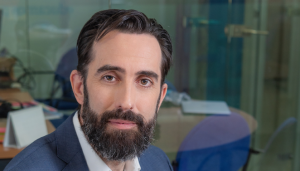Oscar is a part-time MSc Learning and Teaching student on the international route. He has previously undertaken a Bachelor’s degree in Philosophy at Universidad Pontificia de Salamanca and completed a PGCert in Teaching English for Academic Purposes at the University of Leicester. Oscar is also an upper-sixth form Philosophy teacher.
What degree did you apply for and why was it important to you to study this?
I applied for the MSc in Learning & Teaching (MLT) because it was a unique opportunity for both professional growth and organisational development by engaging in genuine research. As a sixth-form teacher seeking to make a dramatic shift from traditional didactic lecturing towards active leaning, it would help me develop the academic skills necessary to take that journey critically. As a school federation leader, it would allow me to explore alternatives for promoting effective educational change at institutional level.
Please give details of your professional commitments:
I am an upper sixth-form philosophy teacher who used to be the school headteacher for many years and moved on to become the Academic Excellence Coordinator of the umbrella organisation, a catholic school federation that brings 21 schools across Spain together with 1,500 teachers in total. My major responsibility is to help my organisation deliver its strategic plan, which is strongly committed to a paradigm shift towards active learning.
What do you hope to go on to do once you’ve completed your postgraduate degree? What do you hope to achieve?
Circumstances permitting, I would love to apply for a DPhil at the Department of Education for both academic and professional purposes. Academically, I would like to contribute something positive to education at large by exploring the degree of suitability of bottom-up, small-scale approaches that use operational, student-centred pedagogies as the key driver for educational change. Professionally, I would like to lead by example: striving to drive organisational development by helping my institution adopt a research-based approach to decision-making.
What do you most value about the teaching at the department?
I find particularly valuable the inclusive and experiential approach to teaching. The part-time nature and the existence of a route for international students provides the MLT with the flexibility necessary to make world-class professional development accessible to any potential teacher who is passionate about education and very keen to excel in their job. The emminently research-oriented course design is really inspirational as it enables students to feel part of the scientific community by doing, while humble, genuine research.
Why do you think it’s important to study education?
I think that education is possibly the most powerful, impactful way to be of service to others and to society at large. For those who earn a living with it and are in leadership or management positions, studying education is a kind of moral duty.
What’s the community (student & staff) like at the department?
The community at the department provides students with an ideal learning environment. The staff in general is very friendly, welcoming, and kind, making you feel at home from the very beginning. Supervisors and teaching staff are really approachable, supportive, and strongly committed to helping you reach your potential. The diversity of students’ backgrounds and interests is impressive, and enriching opportunities to share your experience as a novice researcher, such as the poster conference, are not to be missed.
What advice would you give to new students on how they can get involved in the department community?
I would recommend making the most of the course by attending as many face-to-face seminars as possible. International students are allowed to go online to a certain extent, yet enjoying a genuine Oxford experience requires interacting with other students, meeting teaching staff, feeling the support of your college, and spending time studying in amazing, inspirational libraries such as the Radcliffe Camera.
Did the College add anything to the quality of your student experience, and if so how?
Kellogg College is the ideal place for a part-time, international student at Oxford. It is located in a beautiful area next to the department and has provided me with comfortable accommodation whenever I have needed it, which is particularly valuable in Oxford. I specially remember its warm library, which is open 24 hours a day.

